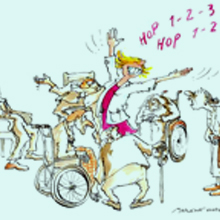
Marlene Pohle es una artista argentina (Lomas / Zamora – Buenos Aires 1939) que terminó desarrollando la mayor parte de su carrera en Alemania. Inició sus estudios artísticos en Argentina, más específicamente en la ciudad de Córdoba. Inició su carrera como pintora, especializándose en la técnica de la acuarela y solo mucho más tarde se dedicó a la ilustración y al dibujo de humor, que comenzó a publicarse en los años 80 en la prestigiosa revista cordubense «Hortênsia», pasando luego como artista independiente. Lancer publicando en todo el mundo.
En 1992 viajó a Alemania para realizar ilustraciones para un libro y acabó afincándose allí (Stuttgart). Desde entonces ha dividido su actividad entre la ilustración y la viñeta, bien publicando en prensa de todo el planeta. Ya sea participando en un concurso internacional, habiendo sido solo premiada en múltiples ocasiones, además de realizar colaboraciones, también organiza talleres, conferencias, participa como jurado en concursos... En 1997 fundó FECO Alemania y en 2005 asumió la Presidencia General de FECO (Federación de Organizaciones de Dibujantes) durante diez años.
Es pues a esta reconocida e internacional artista a la que entrevistamos para que nos cuente un poco su experiencia con el envejecimiento con humor y como ya saben la primera pregunta es -El caricaturista también envejece?
Marlene Pohle - En mi experiencia y por mi entorno de colegas ya entrados en años y que siguen en la brecha, la actividad del caricaturista mantiene la mente alerta y razonadora. Los males físicos son otro cantar.
OMS - ¿Cómo fue la adaptación a las nuevas tecnologías? La velocidad del cambio ha sido vertiginosa, lo que por un lado ha facilitado ciertos trámites técnicos, también ha complicado a los que no les gustaba el cambio. ¿Cómo te pasó a ti? ¿Sigues prefiriendo las técnicas clásicas?
Marlene Pohle - Las nuevas técnicas son no sólo útiles sino interesantes y permiten que nuestro trazo no parezca „anticuado“. Además, para nuestra tarea hace falta seguir informándose y ver lo que hacen los otros colegas por el mundo.
OMS - ¿El envejecimiento también daña la visión filosófica del humor, haciéndolo avinagrado? Con la edad, con el peso de haber vivido, existido, criticado repetidamente… ¿la mirada se vuelve más satírica o irónica?
Marlene Pohle - Eso depende del individuo y de lo que le ha tocado vivir, de la predisposición filosófica de cada uno. Es posible que nos volvamos más críticos, más satíricos, lo cual es un aspecto positivo.
OMS - Básicamente, son muchos años de testigo de cambios en la sociedad, en el comportamiento político y social, además de los técnicos, es decir, no solo eres parte de la historia sino también cronista de esa misma historia. ¿Qué más ha cambiado? ¿Cómo ves esta evolución, principalmente en la actividad del dibujante?
Marlene Pohle - Claro que sí. Con el tiempo y la ejercitación se adquieren destrezas, conocimientos acerca del trabajo de otros, pero también una mayor información de la sociedad, la política, la problemática mundial.
OMS - Toda su vida, otros esperan que un comediante sea una persona alegre y divertida. Con la edad, ¿siguen pidiendo lo mismo o aceptan que también pueden hacer vinagre? ¿O un cómico ha sido siempre un avinagrado como dispensador de sonrisas cómplices?
Marlene Pohle - El ser humano es muy particular y capaz de las preguntas más insólitas y estúpidas. A mí siempre me han divertido mucho estas situaciones durante mis abundantes encuentros de hacer caricaturas en vivo. Estos comentarios a veces te sirven también para una idea que quizás después se convierta en cartoon.
OMS - ¿Qué es más difícil de aceptar a medida que envejeces? ¿Se necesita más esfuerzo para mantener el humor todos los días, o ya no es una fortaleza, sino una debilidad? ¿Te sientes envejecido? ¿Qué es para ti la vejez?
Marlene Pohle - No me siento envejecida. Si bien trabajo menos en cartoons e ilustraciones, me re invento con actividades afines: participar en concursos, organizar exposiciones, participar como jurado, hacer caricaturas en mi block en los bares y cafés, armar un libro...
OMS - ¿Es más fácil mirar la vejez de los demás que tu propia "decadencia" física?
Marlene Pohle- Los viejos son hermosos para caricaturas, me inspiran mucho más que un/una joven de rasgos armónicos. En cuanto a mí, no suelo hacer autorretratos.
OMS - ¿Qué le preocupa más, la falta de memoria o los problemas físicos?
Marlene Pohle - A veces pienso en que la falta de memoria puede llegar a ser algo muy molesto. Probablemente la esté sufriendo ya.
OMS - Cuando haces humor como afición, en el retiro sigue siendo un escape. Si eres profesional desde hace décadas, la jubilación, en principio, es finalmente descansar, pero con humor, ¿no echas de menos este ejercicio constante de mirar la vida al revés? ¿Se abandona por completo o se convierte en un pasatiempo de entretenimiento?
Marlene Pohle - Creo que la jubilación, si bien a mí me molestó cuando me llegó el turno, en la tarea de un dibujante no es un impedimento. Quien es dibujante de alma continuará dibujando aunque sea para sí mismo o para sus nietos. Dibujar no es lo mismo que ser dependiente de una tienda, oficinista o médico cirujano. Estos – creo yo – ven acabado su trabajo y se dedican a descansar o buscarse un entretenimiento. Los que dibujamos lo haremos toda la vida, y con placer.
OMS -. ¿Cómo fue la adaptación a las nuevas tecnologías? La velocidad del cambio ha sido vertiginosa, lo que por un lado ha facilitado ciertos trámites técnicos, también ha complicado a los que no les gustaba el cambio. ¿Cómo te pasó a ti? ¿Sigues prefiriendo las técnicas clásicas?
Marlene Pohle - Tomo de las nuevas técnicas lo que veo me interesa, lo aplico lo mejor que puedo. Siguen gustándome el olor del papel y de las acuarelas y el trazo rápido.
OMS - Las tecnologías cambian, el humor es el mismo, pero la sociedad ha cambiado y ha puesto otras trabas más complicadas a la libertad del humor. ¿Hay tanta o más libertad creativa hoy que antes? La corrección política, más las susceptibilidades idiotas de pequeños grupos, tribus, clubes, partidos… ¿no hizo más presente la censura en las obras publicadas?
Marlene Pohle - Ha cambiado lo que también ha cambiado para todo el mundo: economías colapsadas, políticas irreverentes, migraciones por doquier, invasiones espantosas de un país a otro. Todo lo cual se diría que nos ofrece abundante material para criticar gráficamente, esto es cierto. Pero al mismo tiempo las economías que flaquean estrangulan a empresas, se comienza a descartar cosas que les parecen innecesarias... Lamentablemente para ese mundo, el dibujo editorial o de prensa está catalogado como „innecesario“. Quizás más bien como molesto, así que se van descartando puestos de trabajo en este rubro.
Desde siempre y en diferentes países he visto caricaturistas que trabajan también en otras cosas, sólo los muy brillantes alcanzan un status económico interesante.
OMS - Por supuesto, hay grandes diferencias en la sociedad, en los países, en las influencias geopolíticas y esto siempre influye en la visión del artista, por lo que es redundante preguntar si hay diferencias entre su humor cuando comenzó y ahora, pero puede explicar cuál es en ¿diferente?
Marlene Pohle - No lo sé, sí sé que la rapidez de las comunicaciones produce una mayor unión o información entre las personas, ergo entre los caricaturistas. Incluyendo a las mujeres dibujantes, que gracias a su propio esfuerzo y el de grupos solidarios que las alientan, aparecen por el mundo y con mucho talento y una refinada sensibilidad. En cuanto a la censura, siempre hubo y habrá, y para eso estamos los que la denunciamos.
OMS - Cómo ve la sociedad donde vives a los ancianos?
Marlene Pohle - Muy irregular. Con el gobierno actual en mi país la mayoría de los ancianos viven rondando la línea de pobreza, muchos de ellos viviendo en casa de sus hijos. La sociedad en cambio suele ser solidaria.
OMS - ¿Qué es para ti el humor y cuál es su importancia en la sociedad?
Marlene Pohle - El humor de por sí es fundamental en la vida. Como elemento gráfico es una protesta, una forma certera de incomodar a quien nos gobierna arbitrariamente, un medio relativamente fácil y rápido de información o simplemente de entretenimiento.
OMS - ¿Cree que el humor puede ayudar a las personas a aceptar mejor el envejecimiento y contribuir al optimismo cotidiano del decaimiento físico?
Marlene Pohle - Puede ayudar en cualquier circunstancia.
OMS - ¿Puede el deterioro mental ser contrarrestado por la creatividad humorística? Es decir, si son 12 anécdotas, el resto ya son variaciones en la Biblia, ¿hay una tendencia con la edad a recuperar viejas ideas, tratando de hacer nuevas variaciones, tratando de mejorarlas? ¿Es importante reciclar en el humor?
Marlene Pohle - No es mi caso. Encontrar ideas no es fácil, eso se entrena o se tiene talento natural,pero la imaginación siempre está activa.
OMS - En la vejez, ¿qué es más divertido para jugar o advertir a los demás? ¿Problemas físicos, mentales, sociales o políticos?
Marlene Pohle - Podo lo que ayude a mantener la mente activa.
OMS - ¿Es más fácil, o más difícil, que una persona mayor mire el futuro con humor?
Marlene Pohle - Depende del carácter de cada uno y de la propia postura ante la inevitable muerte.
OMS - ¿Te asusta la muerte o es morirse de risa la mejor manera de cerrar este ciclo? ¿Está preocupado por el futuro de su trabajo después de que se haya ido?
Marlene Pohle - La idea de la muerte no me gusta nada. Sí, a veces pienso en qué será de tanto papel ilustrado que llena mis armarios, pero alguien se ocupará. Y si no, no me voy a enterar. A mí me divierte mucho dibujar, lo demás no importa.
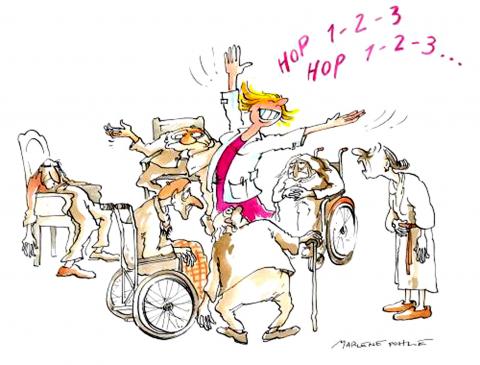
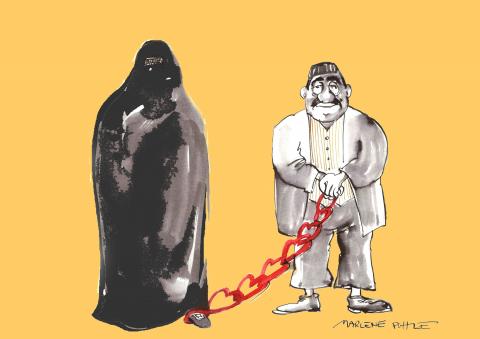
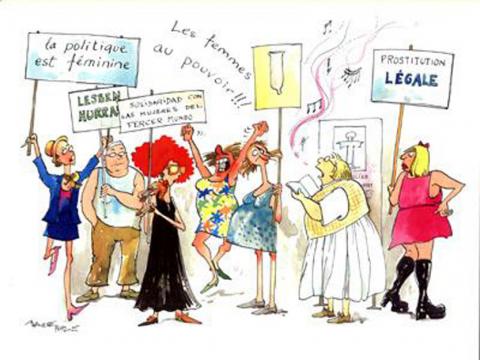
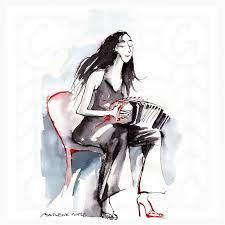
Aging with humor - Marlene Pohle (74 years - Argentina
Marlene Pohle is an Argentine artist (Lomas / Zamora – Buenos Aires 1939) who ended up developing most of her career in Germany. He began his artistic studies in Argentina, more specifically in the city of Córdoba. She began her career as a painter, specializing in the watercolor technique and only much later dedicated herself to illustration and humorous drawing, which began to be published in the 1980s in the prestigious Cordovan magazine "Hortênsia", later becoming an artist. independent. Lancer posting worldwide.
In 1992 he traveled to Germany to do illustrations for a book and ended up settling there (Stuttgart). Since then he has divided his activity between illustration and cartoons, either publishing in the press all over the planet. Whether participating in an international competition, having only been awarded multiple times, in addition to collaborating, she also organizes workshops, conferences, participates as a jury in competitions... In 1997 she founded FECO Germany and in 2005 she assumed the General Presidency of FECO ( Federation of Cartoonists Organizations) for ten years.
It is therefore this renowned and international artist that we interviewed so that she can tell us a little about her experience with aging with humor and, as you already know, the first question is -Does the cartoonist also age?
Marlene Pohle - In my experience and from my environment of colleagues already in years and who are still in the gap, the cartoonist's activity keeps the mind alert and reasoning. Physical ills are another song.
OMS - How was the adaptation to new technologies? The speed of change has been dizzying, which on the one hand has facilitated certain technical procedures, and has also made it difficult for those who did not like the change. How did it happen to you? Do you still prefer the classic techniques?
Marlene Pohle - The new techniques are not only useful but interesting and allow our stroke not to look "old-fashioned". In addition, for our task it is necessary to continue being informed and see what other colleagues are doing around the world.
OMS - Does aging also damage the philosophical vision of humor, making it sour? With age, with the weight of having lived, existed, criticized repeatedly... does the gaze become more satirical or ironic?
Marlene Pohle - That depends on the individual and what they have lived through, on the philosophical predisposition of each one. It is possible that we become more critical, more satirical, which is a positive aspect.
OMS - Basically, many years of witnessing changes in society, in political and social behavior, as well as technical ones, that is, you are not only part of history but also a chronicler of that same history. What else has changed? How do you see this evolution, mainly in the activity of the cartoonist (comedian)?
Marlene Pohle - Of course I do. With time and exercise, skills are acquired, knowledge about the work of others, but also more information about society, politics, and world problems.
OMS - All their lives, others expect a comedian to be a cheerful and funny person. With age, do they still ask for the same thing or do they accept that they can also make vinegar? Or has a comedian always been sour as a dispenser of knowing smiles?
Marlene Pohle - Human beings are very particular and capable of the most unusual and stupid questions. I have always been very amused by these situations during my abundant live cartooning encounters. These comments sometimes also serve you for an idea that may later become a cartoon.
OMS - What is harder to accept as you get older? Does it take more effort to maintain humor every day, or is it no longer a strength, but a weakness? Do you feel old? What is old age for you?
Marlene Pohle - I don't feel old. Although I work less on cartoons and illustrations, I reinvent myself with related activities: participate in contests, organize exhibitions, participate as a jury, make cartoons on my block in bars and cafes, put together a book...
OMS - Is it easier to look at the old age of others than your own physical "decay"?
Marlene Pohle- Old people are beautiful for caricatures, they inspire me much more than a young person with harmonious features. As for me, I don't usually do self-portraits.
OMS - What worries you more, forgetfulness or physical problems?
Marlene Pohle - Sometimes I think that forgetfulness can be very annoying. You are probably suffering from it already.
OMS - When you do humor as a hobby, in retirement it is still an escape. If you have been a professional for decades, retirement, in principle, is finally resting, but with humor, don't you miss this constant exercise of looking at life upside down? Is it completely abandoned or turned into an entertainment hobby?
Marlene Pohle - I think that retirement, although it bothered me when it was my turn, in the work of a draftsman it is not an impediment. Whoever is a cartoonist at heart will continue drawing even if it is for himself or for his grandchildren. Drawing is not the same as being a shop assistant, office worker or surgeon. These - I think - see their work finished and are dedicated to resting or looking for entertainment. Those of us who draw will do it all our lives, and with pleasure.
OMS - How was the adaptation to new technologies? The speed of change has been dizzying, which on the one hand has facilitated certain technical procedures, and has also made it difficult for those who did not like the change. How did it happen to you? Do you still prefer the classic techniques?
Marlene Pohle - I take from new techniques what I see interests me, I apply it to the best of my ability. I still like the smell of paper and watercolors and the quick stroke.
OMS - Technologies change, humor is the same, but society has changed and has placed more complicated obstacles to the freedom of humor. Is there as much or more creative freedom today than before? Political correctness, plus the idiotic sensitivities of small groups, tribes, clubs, parties... didn't censorship make published works more present?
Marlene Pohle - What has also changed for the whole world has changed: collapsing economies, irreverent politics, migration everywhere, horrific invasions from one country to another. All of which could be said to offer us abundant material to criticize graphically, this is true. But at the same time the economies that falter strangle companies, things that seem unnecessary to them begin to be discarded... Unfortunately for that world, editorial or press drawing is classified as "unnecessary". Perhaps more annoying, so jobs in this area are being discarded.
Always and in different countries I have seen cartoonists who also work in other things, only the very bright reach an interesting economic status.
OMS - Of course, there are big differences in society, in countries, in geopolitical influences and this always influences the artist's vision, so it is redundant to ask if there are differences between his humor when he started and now, but you can explain whats in different?
Marlene Pohle - I don't know, I do know that the speed of communication produces greater union or information between people, ergo between cartoonists. Including women cartoonists, who thanks to their own efforts and that of solidarity groups that encourage them, appear all over the world with great talent and a refined sensibility. As for censorship, there has always been and will always be, and that is why we are those who denounce it.
OMS - How does the society where you live view the elderly?
Marlene Pohle - Very irregular. With the current government in my country, most of the elderly live around the poverty line, many of them living at home with their children. Society, on the other hand, is usually supportive.
OMS - What is humor for you and what is its importance in society?
Marlene Pohle - Humor in itself is essential in life. As a graphic element, it is a protest, a sure way to bother those who govern us arbitrarily, a relatively easy and fast means of information or simply entertainment.
OMS - Do you think that humor can help people to better accept aging and contribute to the daily optimism of physical decline?
Marlene Pohle - She can help in any circumstance..
OMS - Can mental deterioration be counteracted by humorous creativity? That is, if there are 12 anecdotes, the rest are already variations in the Bible, is there a tendency with age to recover old ideas, trying to make new variations, trying to improve them? Is it important to recycle in humor?
Marlene Pohle - Not my case. Finding ideas is not easy, you have to train or have natural talent, but your imagination is always active.
OMS - In old age, what is more fun to play or warn others? Physical, mental, social or political problems?
Marlene Pohle - I hear anything that helps keep the mind active.
OMS - Is it easier, or more difficult, for an older person to look at the future with humor?
Marlene Pohle - It depends on each person's character and one's position in the face of inevitable death.
OMS - Does death scare you or is dying of laughter the best way to close this cycle? Are you worried about the future of your job after you're gone?
Marlene Pohle - I don't like the idea of death at all. Yes, sometimes I think about what will become of so much illustrated paper that fills my cupboards, but someone will take care of it. And if not, I will not find out. I enjoy drawing a lot, the rest doesn't matter.
